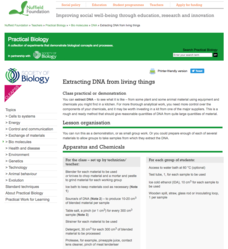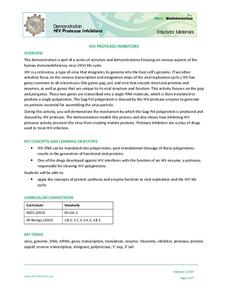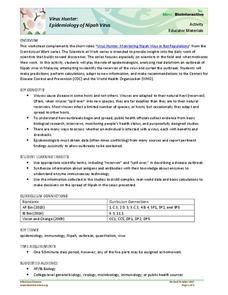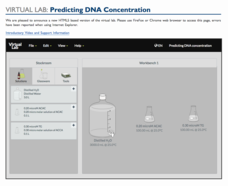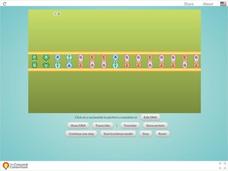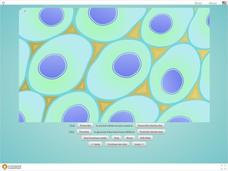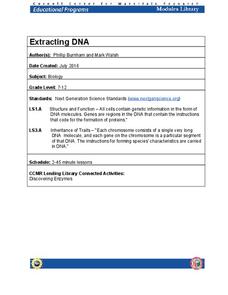Howard Hughes Medical Institute
Visualizing Gene-Expression Patterns
How do genetics gurus know so much about gene expression? See traits materialize before your very eyes using a presentation with embedded simulations. Science scholars develop an understanding of the techniques used to follow the work of...
Howard Hughes Medical Institute
Using DNA to Trace Human Migration
Can scientists trace all humans back to a small region in Africa? An intriguing lesson turns back time to reveal artifacts leading scientists to believe human life originated in Africa and dispersed from there.
Howard Hughes Medical Institute
Microarray Manufacturing Technology
Microarray technology has made advances in scientific research possible. Watch as the videos reveal the manufacturing process of these microarrays. One video shows the automated process while another explains the science behind the...
Howard Hughes Medical Institute
Viral DNA Integration
How do reverse transcriptase inhibitors work? Young virologists examine the function of azidothymidine, a drug doctors use to treat HIV patients, during a hands-on modeling activity. Groups create a strand of DNA from an HIV RNA strand...
Nuffield Foundation
Extracting DNA from Living Things
Help! Someone's trying to take my DNA! An interesting lab experiment has scholars use basic materials to extract DNA. By applying ethanol, cold water, and a protease enzyme, like pineapple juice, they pull strands of DNA from peas,...
Howard Hughes Medical Institute
Central Dogma and Genetic Medicine
Scientists work every day to find solutions to genetic diseases. Scholars learn about the process of gene sequencing, mutations, and the results. They explore genetic diseases and therapies to intervene and help and, through case...
Howard Hughes Medical Institute
Niche Partitioning and DNA Metabarcoding
What is DNA metabarcoding? Show your biology class the latest method for studying biodiversity in an ecosystem with a fun, informative interactive. Individuals examine the animal species that compete for vegetation, then learn how their...
Howard Hughes Medical Institute
DNA Profiling Activity
Everyone loves a good mystery ... can your class actually solve one? Partnered pupils take on the role of forensic investigators during a three-part activity focusing on DNA evidence processing. Learners discover the methods used to...
Howard Hughes Medical Institute
HIV Protease Inhibitors
How do doctors fight a virus that's constantly mutating? Show science scholars how we fight HIV using one of its own most fundamental processes through a thoughtful demonstration. The lesson focuses on how protease inhibitors prevent HIV...
Howard Hughes Medical Institute
Viral DNA Integration
How do viruses hijack our cells to produce more viral particles? Junior immunologists model how viral RNA integrates into a host cell's DNA using pop beads and use interactive tools to explore a virus' genome. The teacher's guide...
Howard Hughes Medical Institute
Virus Hunters: Epidemiology of Nipah Virus
Who actually goes looking for a virus? Expose your class to the high-stakes life of an epidemiologist on the trail of the Nipah virus. Pupils engage in a short video, then examine how scientists predict, model, and find the source of...
Chemistry Collective
Virtual Lab: DNA - Dye Binding: Equilibrium and Buffer Solutions
Your class is bound to be fascinated by this virtual lab! Young biochemists explore molecules that bind to specific sites on the DNA molecule through a skillful simulation. The lesson challenges learners to create a DNA-bound solution...
Chemistry Collective
Virtual Lab: DNA Binding Problem
Why do the bases in DNA pair up the way they do? Unravel the mystery of the double helix in a virtual lab. Young scientists follow in the footsteps of Watson and Crick to determine the free energy associated with DNA base pair binding....
Chemistry Collective
Virtual Lab: Unknown Concentration of DNA Solution Problem
Highlight DNA solution with fluorescent dyes! Scholars use dye to determine the concentration of a DNA solution. As the dyes bind with the DNA solution, learners make conclusions about the limiting reactants.
Chemistry Collective
Virtual Lab: Predicting DNA Concentration
Play a little game of concentration! A virtual lab investigation allows learners to predict the products and reactants of a DNA reaction. They make their calculations and then test their predictions in the lab workbench.
DiscoverE
Building with Biology
Seeing is believing! Bring DNA to life for young biologists using a simple extraction lab. Individuals extract the DNA from wheat germ, then place it in a microcentrifuge tube for observation. They thread yarn or other material through...
Rensselaer Polytechnic Institute
Molecules to the Max!—Teacher's Discovery Guide
Molecules to the Max! refers to a movie released in 2009 about the world of atoms and molecules. A helpful discovery guide provides five posters on science topics typically covered at the middle school level. It also explains the...
Cornell University
Bacteria Take Over and Down
Bacteria outnumber all other forms of life on Earth. Scholars observe the growth of bacteria in petri dishes to understand their role in maintaining good health. Then, they observe the growth of bacteria after they introduce...
Concord Consortium
3D Exploration of Bound Antibody and Antigen
Our body manufactures antibodies that are the exact shape for the antigens it encounters. The simulation shows a 3-D model of an antibody and antigen pairing. It allows young scientists to explore the complementary shapes.
Concord Consortium
DNA: The Double Helix
Picture a double helix as a twisted ladder. Scholars see this image through a simulation that allows young scientists to observe a small fragment of DNA in many different formats. They compare the models, colors, bonds, and strands as...
Concord Consortium
Mutations
Are some mutations more damaging than others? An engaging simulation encourages scholars to alter DNA through insertion, deletion, and substitution. It then forms resulting amino acids—or not—and the resulting protein—or not—depending on...
Concord Consortium
Modeling Transcription
Transcription makes copies of the instructions inside all living things. Scholars use the simulation to separate DNA and transcribe the RNA. They see a demonstration of the nucleotide pairings as well as the start and stop instructions.
Concord Consortium
DNA to Protein
Starting from a view of cells, a constructive simulation shows every step of building a new protein. It walks through transcription, translation, building amino acids, and folding the protein. Viewers control if it plays as a video or...
Cornell University
Extracting DNA
Uncover the basics of DNA structure through exploration activities. Collaborative groups build DNA models and recreate the process of replication. Then, using plant cells such as peas or strawberries, they extract a DNA sample.






